Stores With Stories: The Flower Stand
Zooming up in her compact blue utility vehicle outfitted with a cup holder teeming with pens, a cargo bed holding gardening equipment and paperwork, and a bright yellow sign on the back showing a lady behind the wheel of a tractor, reading “Buy Locally Grown Fresh Flowers and Produce,” Ellen Krzemien (née Rumfola) has just been checking on the progress of her crops.
The late spring fields are planted with rows of emergent flower seedlings – about a month and a half away from summer’s full blooms. Ellen shows spreadsheets of dozens of columns of fine print tracking species, colors, heights, and propagation success.
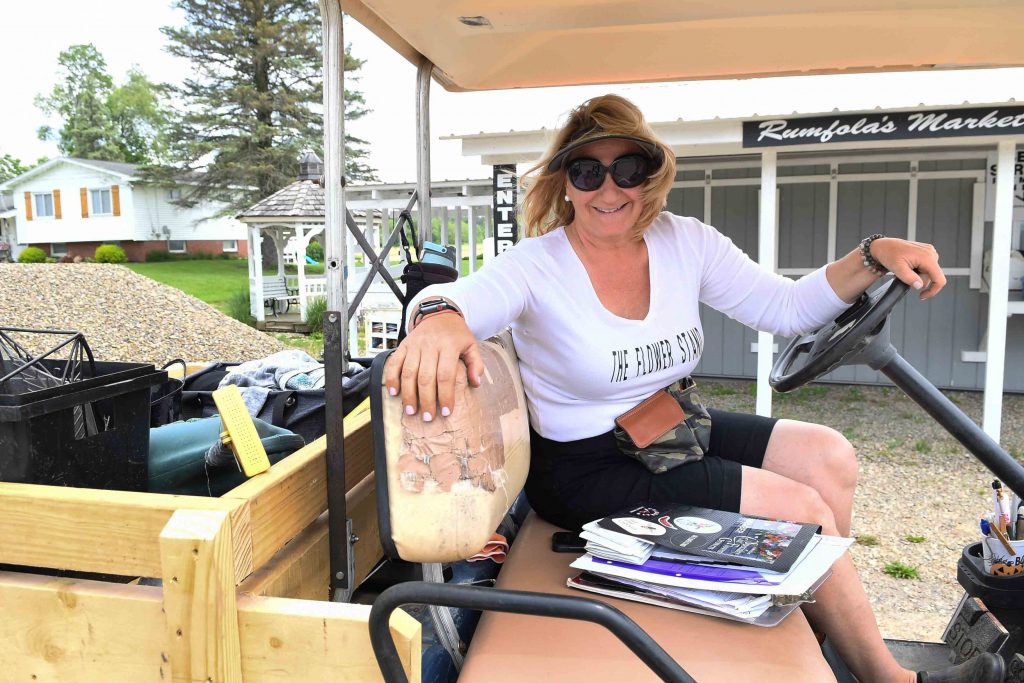
The Flower Stand owner Ellen Krzemien
“This is the layout of the field, areas A to J, in 18 rows making up the main garden. Then the area behind it is a duplicate of it. There are several kinds of zinnias available, for example, in different stem lengths.” There are perennials, ever-popular dahlias, lavender, Queen Anne’s lace, feverfew, cosmos, baby’s breath, and many more. Flowers in the “everlasting section” include rows of lisianthus, strawflowers, status, and verbena. “I also have an herb area with dill, basil, chamomile, and huacatay – Peruvian mint, with bright green, spiky leaves,” she says.
Transforming a portion of her third-generation family farm, Ellen has created a unique u-pick of a myriad of fresh flowers. It’s agri-tourism, and a fun, family-friendly destination in Springville, New York that’s an easy 36-minute drive from downtown Buffalo.
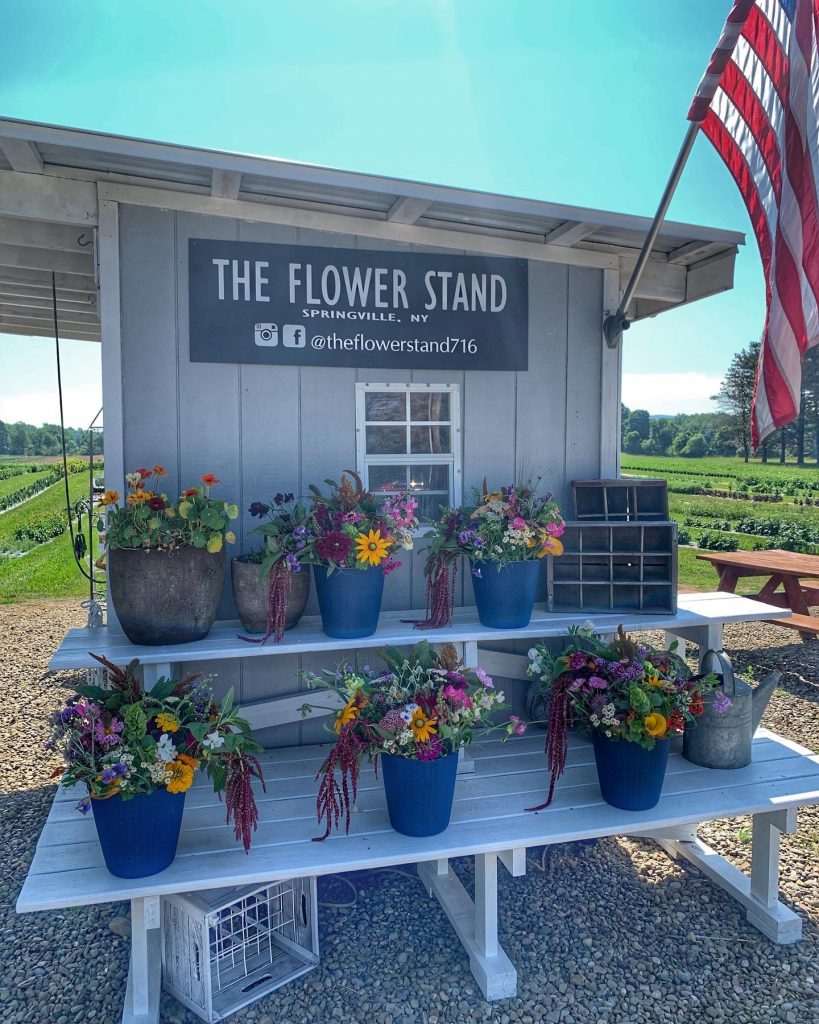
The Flower Stand, located along Route 240, typically opens around the Fourth of July after what Ellen refers to as her “tax season to get the entire field planted.” She, her husband Jon, her dad Joe, and other helpers plant thousands of seeds for a yield lasting through the first frost, usually mid-October, when several varieties of pumpkins enter the mix.
“My whole life my family has owned this farm – and Rumfola’s Market – since the 1930s and all told it’s 100 acres,” she says. “It’s always a leap of faith. I plant things in the middle of May, hoping there will be no more frost.” What began as 1.5 acres is “pushing into 4 acres now. We’ve had consistent growth and popularity,” she says.
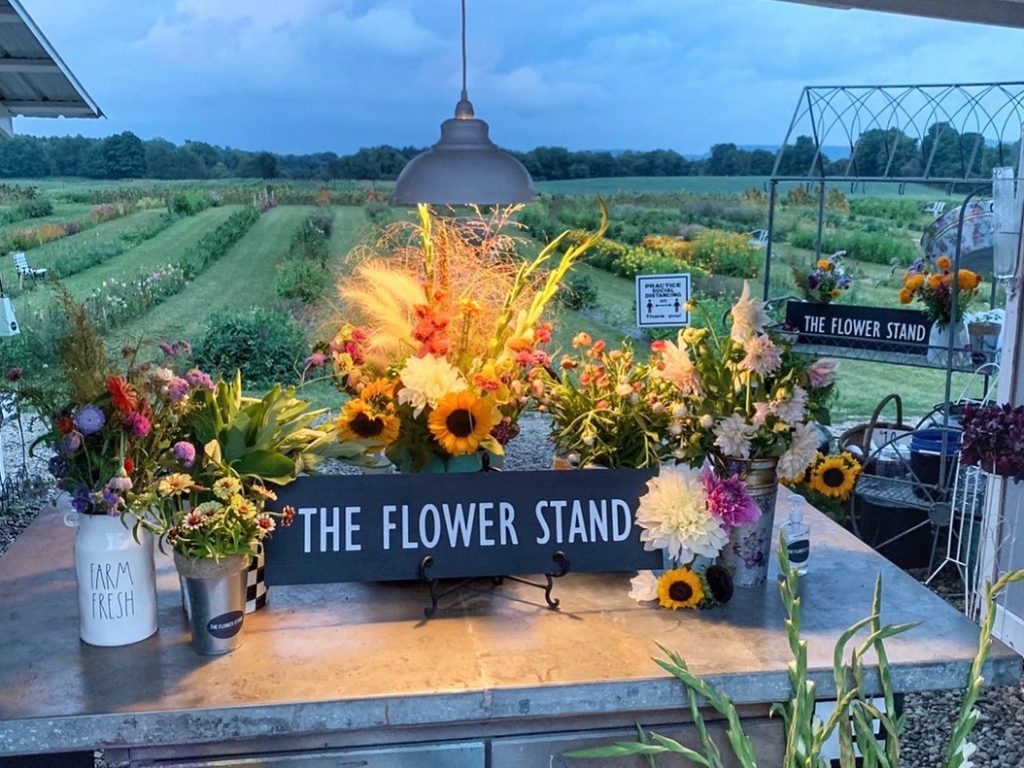
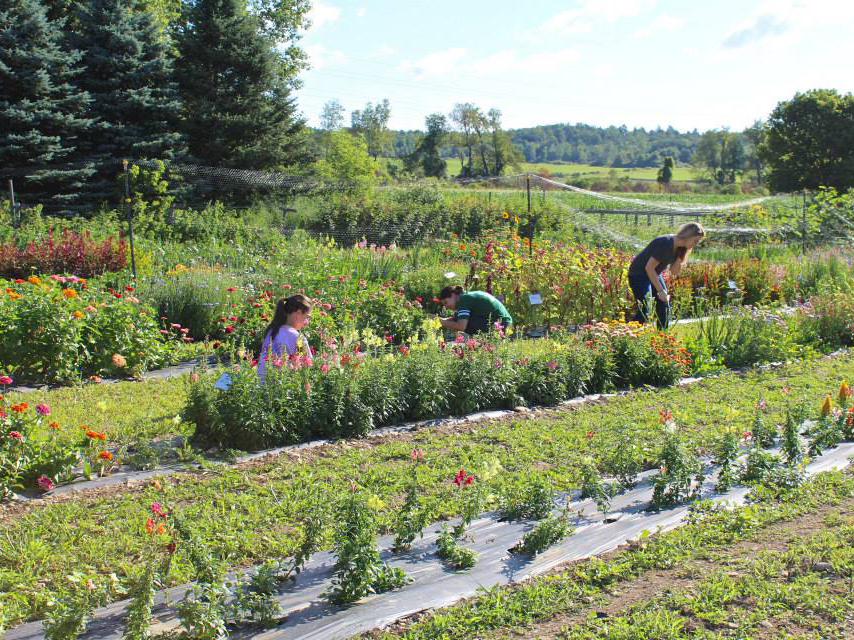
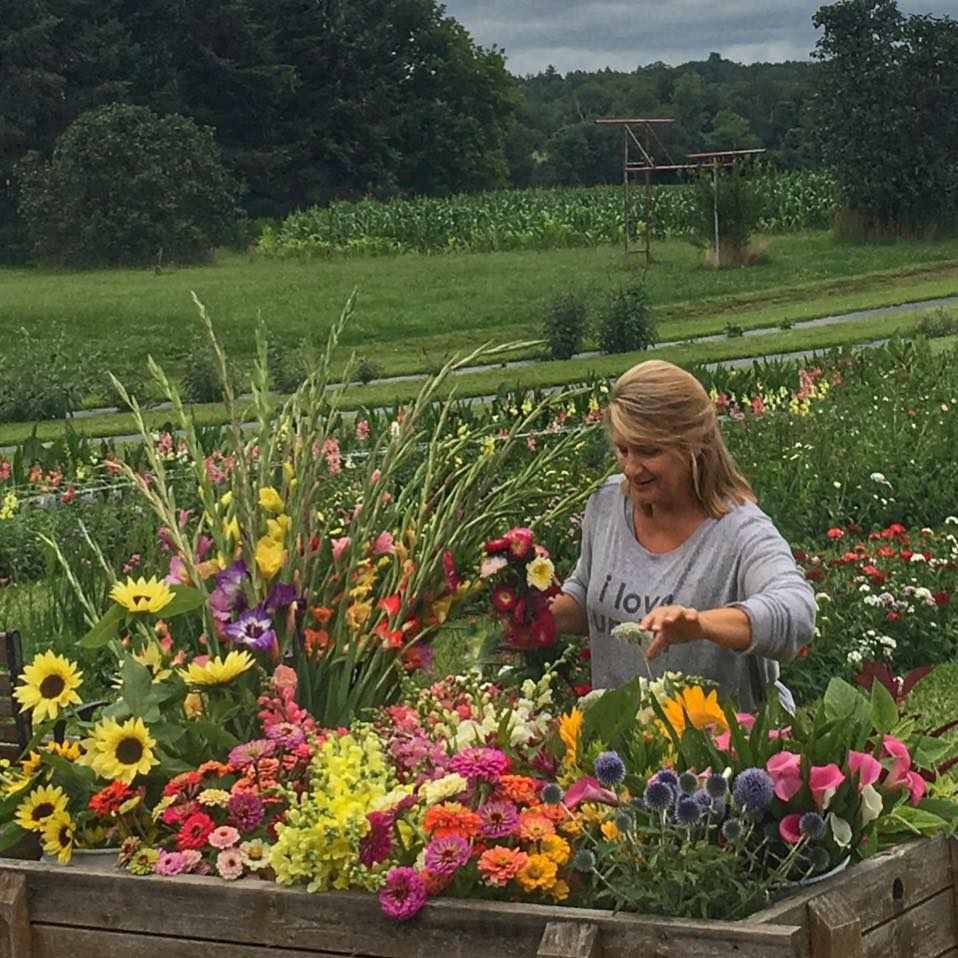
Visits for posy picking are by appointment only; reservations may be made via their website for a 90-minute time slot on one of their days of operation. This, Ellen says, keeps the farm’s plants and grounds healthy by limiting visitors during their open hours Tuesdays-Sundays, 10 a.m. to 5 p.m.
Everyone is asked to check in and out at the desk located under the awning at their adorable, wooden farmstand, close to the road and adjacent to the parking spots available to u-pickers. Displays outside sell already-cut bouquets, and vegetables grown on the farm. Inside, the small shop carries flower-related gift items like themed t-shirts, tea towels, pots, dried herbs, and bottled water.
All of the necessary equipment is provided for picking – pruners and containers – but anyone may use their own pruners. Bouquet pricing is by the container size/width of its opening: half-gallon or gallon-sized jugs, buckets (small, large, or event-sized), bud vase, and flower box vase. Ellen says that the gallon jug is their biggest seller, priced at $35.
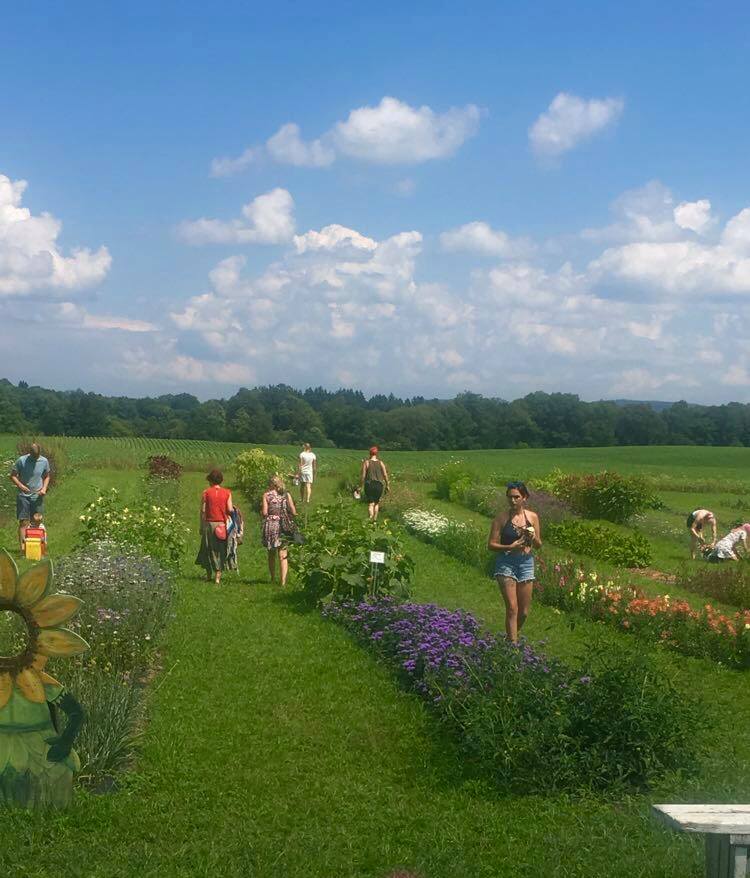
Besides The Flower Stand, Ellen runs a CSA (community supported agriculture) subscription for bouquets, with pick-up sites at the farm, in Orchard Park, and in Larkinville. Since 2005, as Ellen K. Design, she has created floral arrangements and bouquets for weddings and events, and home staging for her real estate clients.
“I first grew flowers to put in my staged homes,” she says. “I sold my surplus flowers at our farm’s roadside stand; it was a hobby at first and then I started getting phone calls – then orders – for my flowers so then the growing became more intentional. And then I was designing little bouquets all the time in my mind.”
“The Flower Stand is part of the ‘Grown, not Flown’ movement of flower farms,” she adds. “It’s a different vibe, and it’s organic. It’s also about mixing native plants with others for a more diverse, natural look.”
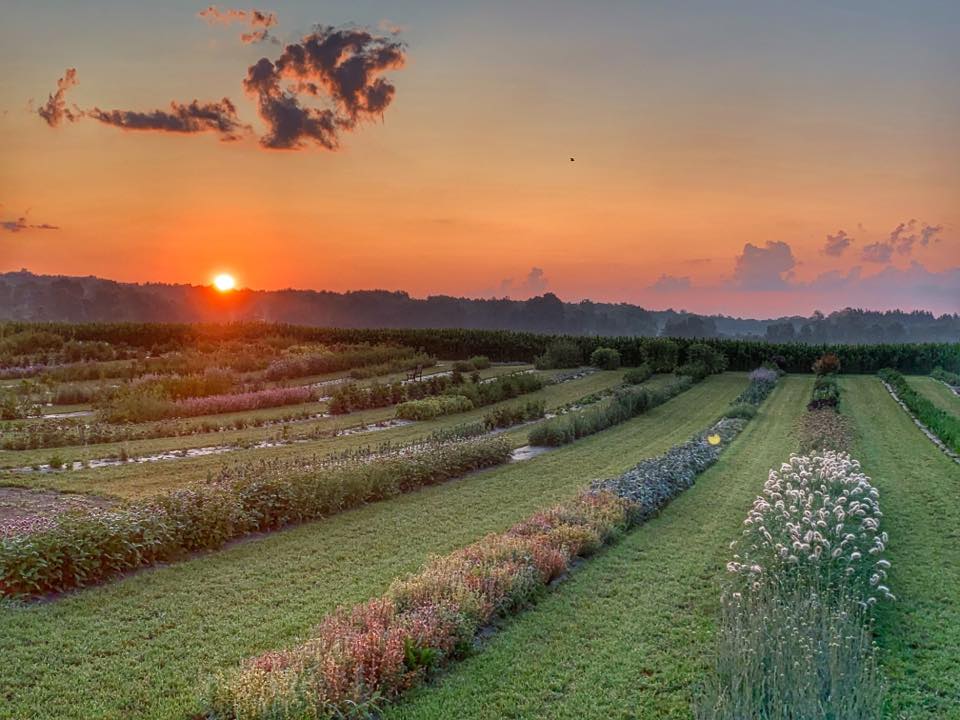
Ellen completed the Master Gardener Program at Cornell Co-Operative Extension training course in 2017. “Now I’m an active member,” she says, noting that she is always actively learning more about growing, flowers, and business. She’s also a proud, certified Women-Owned Business Enterprise (WBE) in Erie County. She says she’s contemplating opening a wedding venue on the farm, another seemingly natural progression of her business experience.
“A lot of good things happen here on the farm, people have a visceral reaction to this field. I always say ‘Come with your people, or alone. It’s a meditative experience and there are benches, and butterflies to just sit and be.”

